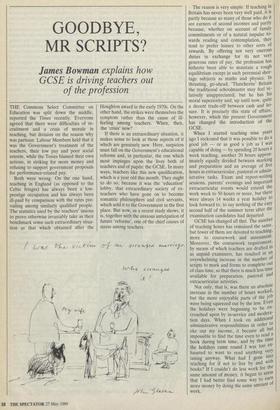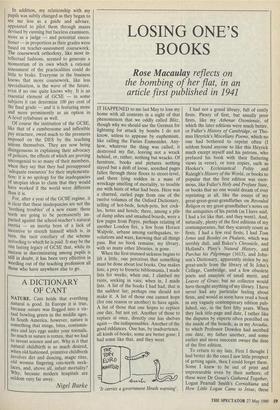GOODBYE, MR SCRIPTS?
James Bowman explains how GCSE is driving teachers out of the profession
THE Commons Select Committee on Education was split down the middle, reported the Times recently. Everyone agreed that there were difficulties of re- cruitment and a crisis of morale in teaching, but division on the reason why was partisan: Labour Members held that it was the Government's treatment of the teachers, their low pay and poor social esteem, while the Tories blamed their own actions, in striking for more money and refusing to support government proposals for performance-related pay.
Both were wrong. On the one hand, teaching in England (as opposed to the Celtic fringes) has always been a low- prestige occupation and has always been ill-paid by comparison with the rates pre- vailing among similarly qualified people. The statistics used by the teachers' unions to prove otherwise invariably take as their benchmark some such extraordinary situa- tion as that which obtained after the Houghton award in the early 1970s. On the other hand, the strikes were themselves the symptom rather than the cause of ill- feeling among teachers. When, then, the 'crisis' now?
If there is an extraordinary situation, it makes sense to look at those aspects of it which are genuinely new. Here, suspicion must fall on the Government's educational reforms and, in particular, the one which most impinges upon the lives both of teachers and of pupils: the GCSE. In many ways, teachers like this new qualification, which is a year old this month. They ought to do so, because it was the 'education' lobby, that extraordinary society of ex- teachers who have gone on to become romantic philosophers and civil servants, which sold it to the Government in the first place. But now, as a recent study shows, it is, together with the anxious anticipation of future 'reforms', one of the chief causes of stress among teachers. The reason is very simple. If teaching in Britain has never been very well paid, it is partly because so many of those who do it are earners of second incomes and partly because, whether on account of family commitments or of a natural impulse to- wards reading and contemplation, they tend to prefer leisure to other sorts of rewards. By offering not very onerous duties in exchange for its not very generous rates of pay, the profession has hitherto been able to maintain a rough equilibrium except in such perennial shor- tage subjects as maths and physics. In thrusting, go-ahead, `Thatcherite' Britain the traditional schoolmaster may feel re- latively unappreciated, but he has his moral superiority and, up until now, quite a decent trade-off between cash and lei- sure. It is precisely this state of affairs, however, which the present Government has changed the introduction of the GCSE.
When I started teaching nine years ago I reckoned that it was possible to do a good job — or as good a job as I was capable of doing — by spending 20 hours a week teaching, another 20 hours approx- imately equally divided between marking and preparation and an average of five hours in extracurricular, pastoral or admin- istrative tasks. Exam and report-writing sessions, parents' evenings and important extracurricular events would extend the work week to 50 hours or more, but there were always 14 weeks a year holiday to look forward to, to say nothing of the easy second half of the summer term after the examination candidates had departed. GCSE has changed all that. The number of teaching hours has remained the same, but fewer of them are devoted to teaching, more to coursework and assessment. Moreover, the coursework requirement, by means of which teachers are drafted in as unpaid examiners, has resulted in an overwhelming increase in the number of scripts to mark and forms to complete out of class time, so that there is much less time available for preparation, pastoral and extracurricular activities. Not only, that is, was there an absolute increase in the number of hours worked, but the more enjoyable parts of the job were being squeezed out by the less. Even the holidays were beginning to be en- croached upon by in-service and modera- tion days. When I took on additional administrative responsibilities in order to eke out my income, it became all but impossible to find the time even to read a book during term time, and by the time the holidays came round I was too ex- hausted to want to read anything very taxing anyway. What had I gone into teaching for if not to live by and with books? If I couldn't do less work for the same amount of money, it began to seem that I had better find some way to earn more money by doing the same amount of work. In addition, my relationship with my Pupils was subtly changed as they began to see me less as a guide and adviser, appointed to pilot them through mazes devised by cunning but faceless examiners, more as a judge — and potential execu- tioner — in proportion as their grades were based on teacher-assessment coursework. The coursework orthodoxy, like most in- tellectual fashions, seemed to generate a momentum of its own which a rational assessment of the practicalities could do little to brake. Everyone in the business knows that more coursework, like less specialisation, is the wave of the future, even if no one quite knows why. It is an essential element of GCSE — in some subjects it can determine 100 per cent of the final grade — and it is featuring more and more prominently as an option in A-level syllabuses as well. Of course the institution of the GCSE, like that of a cumbersome and inflexible pay structure, owed much to the pressures imposed on the DES by the teaching unions themselves. They are now being disingenuous in explaining their advocacy of policies, the effects of which are proving uncongenial to so many of their members, when they say that they had presupposed 'adequate resources' for their implementa- tion: it is no apology for the inadequacies of utopian ideas to claim that they would have worked if the world were different than it is.
For, after a year of the GCSE regime, it Is clear that these inadequacies are not the 'teething troubles' of a new exam: these teeth are going to be permanently im- pacted against the school-teacher's natural inertia — an inertia born of a lack of incentive to stretch himself which is, in turn, the tacit corollary of the scheme according to which he is paid. It may be the one lasting legacy of GCSE that, while its success in discriminating among pupils is still in doubt, it has been very effective in weeding out of the teaching profession all those who have anywhere else to go.



















































 Previous page
Previous page